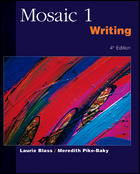 |  Mosaic 1 Writing, 4/e Laurie Blass
Meredith Pike-Baky
Internet Publishing| Narrator: Fifteen-year-old William Bass enjoys surfing the Web, downloading sports articles and music. And he downloaded something else for the first time, Stephen King's latest book.Bass: Well it's the comfort of your own home, of course, and you don't have to go out and buy it. It's right there any time of the night. A bookstore might be closed, and you have the computer right there.Narrator: King made available on his Web site the first installment of his novel The Plant. Price for the reader: $1, on the honor system. There is some incentive to pay too. King says if revenue runs less than 75% of the downloads, he won't finish the book. Regardless, this electronic publishing that skips the publisher and goes right to the reader left the book world in a buzz. Thinking is it could be big publishing's worst nightmare. Those who follow the book business don't think so.Publisher: It doesn't change the fundamental working of the industry. The functions stay there. It seems scary because it is unknown. Stephen King trades on the unknown.Narrator: With more books online, faster connections now with DSL, cable, and fiber optics, and bigger computers, it means the death of the old-fashioned book on paper, right? McCombs: Absolutely not.Narrator: Jillian McCombs is SMU's [Southern Methodist University] top librarian. She believes the simple technology of ink on paper will survive just fine.McCombs: A computer allows you to go back and forward, but there are no visual cues. For instance, in a page in a book situation you can remember that dog-eared page back 30 pages where you first read about Estela doing X, Y, or Z. But on your computer screen, it is a little harder to do that.Narrator: The SMU library offers e-books and McCombs hopes publishers add more, especially from little-known authors who don't have King's marketing clout. As far as paper books, the final chapter has yet to be written on their demise.
|
|



 2002 McGraw-Hill Higher Education
2002 McGraw-Hill Higher Education

 2002 McGraw-Hill Higher Education
2002 McGraw-Hill Higher Education